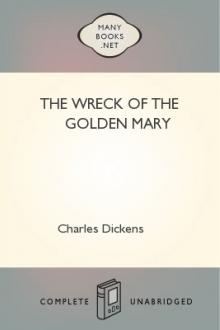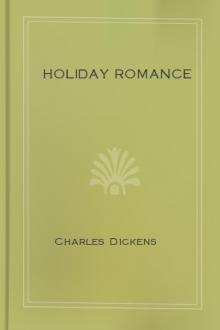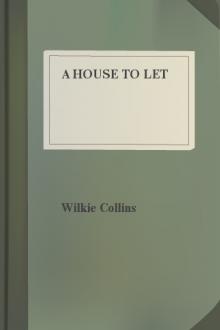author - "Charles Dickens"

s well to be on the safe side, sir," replied Tom."Safe side!" repeated the captain, laughing. "You'd guard against asun-stroke, with that old hat, in an Ice Pack. Wa'al! What haveyou made out at the Post-office?" "It is the Post-office, sir." "What's the Post-office?" said the captain. "The name, sir. The name keeps the Post-office." "A coincidence!" said the captain. "A lucky bit! Show me where itis. Good-bye, shipmates, for

culiar difficulties and dangers in it, a long way over and above those which attend all voyages. It must not be supposed that I was afraid to face them; but, in my opinion a man has no manly motive or sustainment in his own breast for facing dangers, unless he has well considered what they are, and is able quietly to say to himself, "None of these perils can now take me by surprise; I shall know what to do for the best in any of them; all the rest lies in the higher and greater hands to

p> The two letters to Mr. Macready, at the end of this year, refer to a farce which Charles Dickens wrote, with an idea that it might be suitable for Covent Garden Theatre, then under Mr. Macready's management. [Sidenote: Mrs. Charles Dickens.] GRETA BRIDGE, Thursday, Feb. 1st, 1838. MY DEAREST KATE, I am afraid you will receive this later than I could wish, as the mail does not come through this place until two o'clock to-morrow morning. However, I have availed myself of the very first

earnestness. He even found leisure to organize a theatrical company (in which he himself acted with a number of other famous writers of the time), which gave several plays for the benefit of charity. One of these was performed before Queen Victoria.People have often wondered how Dickens found time to accomplish so many different things. One of the secrets of this, no doubt, was his love of order. He was the most systematic of men. Everything he did "went like clockwork," and he prided

ts upon them for the price of the birds; others had bills of exchange in their pockets, or in belts. Some of these documents, carefully unwrinkled and dried, were little less fresh in appearance that day, than the present page will be under ordinary circumstances, after having been opened three or four times.In that lonely place, it had not been easy to obtain even such common commodities in towns, as ordinary disinfectants. Pitch had been burnt in the church, as the readiest thing at hand, and

illings, say five, say two andsix. You don't say even two and six? You say two and three? No.You shan't have the lot for two and three. I'd sooner give it toyou, if you was good-looking enough. Here! Missis! Chuck the oldman and woman into the cart, put the horse to, and drive 'em awayand bury 'em!" Such were the last words of Willum Marigold, my ownfather, and they were carried out, by him and by his wife, my ownmother, on one and the same day, as I ought to know, having followedas

Meg!""Good gracious me!" said Meg presently, "father's crazy. He's put the dear child's bonnet on the kettle, and hung the lid behind the door!" Trotty hastily repaired this mistake, and went off to find some tea and a rasher of bacon he fancied "he had seen lying somewhere on the stairs." He soon came back and made the tea, and before long they were all enjoying the meal. Trotty and Meg only took a morsel for form's sake (for they had only a very little, not

Slinkton. There he was, standing before the fire, with good large eyes and an open expression of face; but still (I thought) requiring everybody to come at him by the prepared way he offered, and by no other.I noticed him ask my friend to introduce him to Mr. Sampson, and my friend did so. Mr. Slinkton was very happy to see me. Not too happy; there was no over-doing of the matter; happy in a thoroughly well-bred, perfectly unmeaning way. 'I thought you had met,' our host observed. 'No,' said

red the anguish of my own bride's being also made a witness tothe same point, but the admiral knew where to wound me. Be still,my soul, no matter. The colonel was then brought forward with hisevidence.It was for this point that I had saved myself up, as the turning-point of my case. Shaking myself free of my guards, - who had nobusiness to hold me, the stupids, unless I was found guilty, - Iasked the colonel what he considered the first duty of a soldier?Ere he could reply, the President of the

legs and a little smile, and a little voice, and littleround-about ways. As long as I can remember him he was always goinglittle errands for people, and carrying little gossip. At this presenttime when he called me "Sophonisba!" he had a little old-fashionedlodging in that new neighbourhood of mine. I had not seen him for two orthree years, but I had heard that he still went out with a littleperspective-glass and stood on door-steps in Saint James's Street, to seethe nobility go to

s well to be on the safe side, sir," replied Tom."Safe side!" repeated the captain, laughing. "You'd guard against asun-stroke, with that old hat, in an Ice Pack. Wa'al! What haveyou made out at the Post-office?" "It is the Post-office, sir." "What's the Post-office?" said the captain. "The name, sir. The name keeps the Post-office." "A coincidence!" said the captain. "A lucky bit! Show me where itis. Good-bye, shipmates, for

culiar difficulties and dangers in it, a long way over and above those which attend all voyages. It must not be supposed that I was afraid to face them; but, in my opinion a man has no manly motive or sustainment in his own breast for facing dangers, unless he has well considered what they are, and is able quietly to say to himself, "None of these perils can now take me by surprise; I shall know what to do for the best in any of them; all the rest lies in the higher and greater hands to

p> The two letters to Mr. Macready, at the end of this year, refer to a farce which Charles Dickens wrote, with an idea that it might be suitable for Covent Garden Theatre, then under Mr. Macready's management. [Sidenote: Mrs. Charles Dickens.] GRETA BRIDGE, Thursday, Feb. 1st, 1838. MY DEAREST KATE, I am afraid you will receive this later than I could wish, as the mail does not come through this place until two o'clock to-morrow morning. However, I have availed myself of the very first

earnestness. He even found leisure to organize a theatrical company (in which he himself acted with a number of other famous writers of the time), which gave several plays for the benefit of charity. One of these was performed before Queen Victoria.People have often wondered how Dickens found time to accomplish so many different things. One of the secrets of this, no doubt, was his love of order. He was the most systematic of men. Everything he did "went like clockwork," and he prided

ts upon them for the price of the birds; others had bills of exchange in their pockets, or in belts. Some of these documents, carefully unwrinkled and dried, were little less fresh in appearance that day, than the present page will be under ordinary circumstances, after having been opened three or four times.In that lonely place, it had not been easy to obtain even such common commodities in towns, as ordinary disinfectants. Pitch had been burnt in the church, as the readiest thing at hand, and

illings, say five, say two andsix. You don't say even two and six? You say two and three? No.You shan't have the lot for two and three. I'd sooner give it toyou, if you was good-looking enough. Here! Missis! Chuck the oldman and woman into the cart, put the horse to, and drive 'em awayand bury 'em!" Such were the last words of Willum Marigold, my ownfather, and they were carried out, by him and by his wife, my ownmother, on one and the same day, as I ought to know, having followedas

Meg!""Good gracious me!" said Meg presently, "father's crazy. He's put the dear child's bonnet on the kettle, and hung the lid behind the door!" Trotty hastily repaired this mistake, and went off to find some tea and a rasher of bacon he fancied "he had seen lying somewhere on the stairs." He soon came back and made the tea, and before long they were all enjoying the meal. Trotty and Meg only took a morsel for form's sake (for they had only a very little, not

Slinkton. There he was, standing before the fire, with good large eyes and an open expression of face; but still (I thought) requiring everybody to come at him by the prepared way he offered, and by no other.I noticed him ask my friend to introduce him to Mr. Sampson, and my friend did so. Mr. Slinkton was very happy to see me. Not too happy; there was no over-doing of the matter; happy in a thoroughly well-bred, perfectly unmeaning way. 'I thought you had met,' our host observed. 'No,' said

red the anguish of my own bride's being also made a witness tothe same point, but the admiral knew where to wound me. Be still,my soul, no matter. The colonel was then brought forward with hisevidence.It was for this point that I had saved myself up, as the turning-point of my case. Shaking myself free of my guards, - who had nobusiness to hold me, the stupids, unless I was found guilty, - Iasked the colonel what he considered the first duty of a soldier?Ere he could reply, the President of the

legs and a little smile, and a little voice, and littleround-about ways. As long as I can remember him he was always goinglittle errands for people, and carrying little gossip. At this presenttime when he called me "Sophonisba!" he had a little old-fashionedlodging in that new neighbourhood of mine. I had not seen him for two orthree years, but I had heard that he still went out with a littleperspective-glass and stood on door-steps in Saint James's Street, to seethe nobility go to